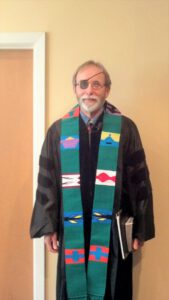Reflecting on how I have been formed as a religious educator has confirmed what the southern author Eudora Welty (1909-2001) once wrote: “Wherever you go, you meet part of your story.”
Consistent with Horace Bushnell’s maxim, my upbringing in a devout Christian (Baptist) home, I never knew myself to be other than – by some definition – Christian. My parents and the churches in which we would be involved (my father was in the Army during most of my growing up) inculcated the importance of one’s overt profession of one’s faith. The religious education toward that step and afterward included worship, Bible study and memorization, basic doctrinal study, etc. That my parents were joined by ministers and so many other lay persons impressed on me the importance and personal nature of teaching children and others in faith.
Natural maturation and continuing involvement in churches around the U.S. resulted in my seeing the dire need for religious education that not only dealt with orthodoxy and orthopraxy (terms I did not understand until later), but resulted in lives and churches more reflective of what I understood to be the core of Jesus’ teaching. Early experiences in parish ministry as well as undergraduate and graduate ministerial education served to confirm this vision that religious education be more prophetic in nature and not just a means of cultural reproduction. Success would require the amalgamation of well-thought theology (for all that means) with sound pedagogy.
Through reading, research and study, I was enriched not only by “the classics”, but also by such diverse writers as Thomas Merton, Elton Trueblood, Clarence Jordan, Will Campbell, et al, I discovered I was not alone in my concern. Through reading – then meeting and, I like to think, befriending — Findley Edge I saw how religious educators can and should be part of revitalizing churches toward more authentic Christianity. James Fowler showed that the religious educator must be patient with persons as they work through stages of faith and diligent to help them do so. At the same time Maria Harris encouraged me to remain revolutionary in implementing the various types of curricula that undergird and are religious education. Tom Groome provided a model by which religious education (indeed, I think, all areas of ministry) can be more effective by leading people to reflect on how they (their stories) really are part of the story of the larger faith fellowship and how that can and should make a positive difference.
Of course, there are so many others that, as Welty observed in the aforementioned quote, have served to form me as a religious educator because I have met them and they have become part of my story. That has been one of the many joys and blessings of being part of REA/APPRRE over the years and in its permutations. Having colleagues and friends from among many differing Christian denominations and churches as well as other faiths has enriched my life. The dialogue we have shared has been respectful and, often, loving, despite disagreements often deep and strongly held. In this you have challenged me and accepted me and have been an important part of my continuing formation as a religious educator even into retirement. For that I will always be grateful. [On an even more personal note, yet still part of my formation as a religious educator, the fellowship we have shared in REA/APPRRE has played no small part in easing my recent transition from being a “life-long” Baptist to joining a Presbyterian (PCUSA) church.]
